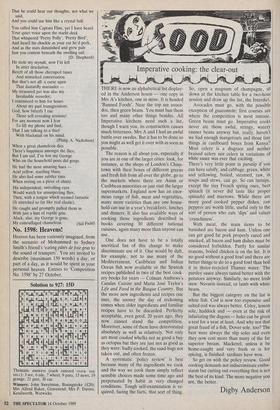Imperative cooking: the clear-out
THERE is now an alphabetical list display- ed in the Anderson house — one copy in Mrs A's kitchen, one in mine. It is headed `Banned Foods', Near the top are avoca- dos, then green beans. You must ban them too and many other things besides. All Imperative kitchens need such a list, though I warn you, its construction causes much bitterness. Mrs A and I had an awful battle over swedes. But it has to be done so you might as well get it over with as soon as possible.
The reason is all about you, especially if you are in one of the larger cities: look, for instance, at the shops of London's China- town with their boxes of different greens and fresh fish from all over the globe, go to the markets where there are Asian or Caribbean minorities or just visit the larger supermarkets. England now has an enor- mous range of fish, meat and vegetables, many more varieties than any one house- hold can use in a year's breakfasts, lunches and dinners. It also has available ways of cooking those ingredients described in books covering 30 different national cuisines, again many more than anyone can use.
One does not have to be a totally uncritical fan of this change to make discriminate use of it. One would be daft, for example, not to use many of the Mediterranean, Caribbean and Indian Ocean fish now available or the Spanish recipes published in two of the best cook- ery books for years — Colman Andrews's Catalan Cuisine and Maria Jose Taylor's Life and Food in the Basque Country. But the more new ingredients and recipes one uses, the sooner the day of reckoning comes when older ingredients and familiar recipes have to be discarded. Perfectly acceptable, even good, 20 years ago, they now cannot stand the competition. Moreover, some of them have deteriorated absolutely as well as relatively. Not only are most cooked whelks not as good a buy as octopus but they are just not as good as they were: badly cooked, the sand-bags not taken out, and often frozen.
A systematic 'policy review' is best because many of the ingredients we cook and the way we cook them simply reflect sensible choices made some time ago and perpetuated by habit in very changed conditions. Tough self-examination is re- quired, facing the facts, that sort of thing.
So, open a magnum of champagne, sit down at the kitchen table for a two-hour session and draw up the list, the Interdict.
Avocados must go, with the possible exception of guacomole: first courses are where the competition is most intense. Green beans must go. Imperative cooks never ate those awful, stringy, watery runner beans anyway but, really, haven't we had enough mangetouts and those tiny things in cardboard boxes from Kenya? Most celery is a disgrace and neither braised celery nor celery in variations of white sauce was ever that exciting.
There's very little point in parsnip if you can have salsify, and cabbage, green, white and yellowing, boiled, steamed, raw, in soups and stews, can go. So can turnips, except the tiny French spring ones, beet spinach (it never did taste like proper spinach) and marrows. While there are many good cooked pepper dishes, raw peppers are worth little, useful only to the sort of person who eats 'dips' and values `crunchiness'.
With meat, the main items to be banished are bacon and ham. Unless one can get good fat pork properly cured and smoked, all bacon and ham dishes must be considered forbidden. Partly for similar reasons, boiled chicken is on the list. It is no good without a good fowl and there are better things to do to a good fowl than boil it in thrice-recycled Thames water. The parsley sauce always tasted better with the potatoes anyway. Similarly, no more Irish stew. Navarin instead, or lamb with white beans.
But the biggest category on the list is white fish. Cod is now too expensive and salted cod was always better. Coley, lemon sole, haddock and — even at the risk of infuriating the dagoes — hake can be given a rest for a year at least. And why not that great fraud of a fish, Dover sole, too? The best were always the slip soles and even they now cost more than many of the far superior bream. Mackerel, unless it be home-caught and very fresh or is for spicing, is finished: sardines have won.
So get on with the policy review. Good cooking demands not indiscriminate enthu- siasm but cutting out everything that is not the best of its kind. The more negative you are, the better.
Digby Anderson


























































 Previous page
Previous page